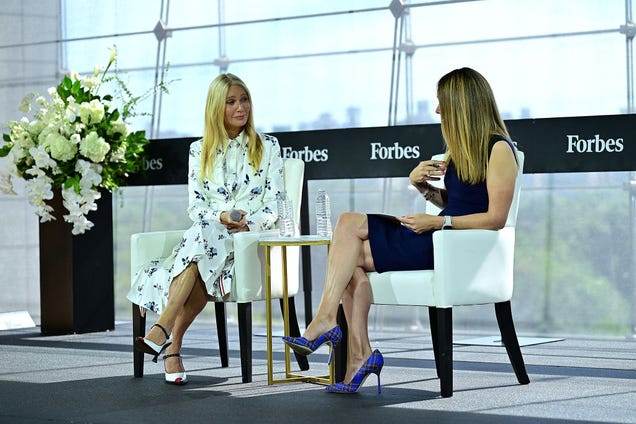Gwyneth Paltrow’s Goop took wellness mainstream. How did it lose its edge?

Lifestyle
In This Story
For more than 15 years, Gwyneth Paltrow’s lifestyle empire, Goop, has been ever-present in the cultural conversation. Goop has been a newsletter, an e-commerce company, a podcast, a wellness summit, a magazine, and even a show.
Suggested Reading
OpenAI’s Safety and Security Committee is going independent and they have some suggestions
Suggested Reading
It has also been the subject of derision. Its guide to yawning, promotion of an eight day goat milk cleanse, and advice to speak kindly to your water, are just a few examples of its content dragged by the masses.
Perhaps most infamously, Goop gave readers frequent, dubious advice about their vaginas. The site advised people to treat yeast infections by only eating one piece of fruit a day. The Goop store sold a $66 egg-shaped jade or rose quartz stone that could be inserted into the body to “increase vaginal muscle tone.” In 2015, Paltrow advised her audience to “steam” their vaginas. Four years later, she began selling candles called “This Smells Like My Vagina.”
But after a decade-and-a-half, are Goop’s best (and strangest) days behind it? Wellness is no longer a niche topic: In 2022, the industry brought in $5.6 trillion in revenue, according to a report from the Global Wellness Institute. Yet, Goop, a brand that propelled wellness into the mainstream, seems suddenly absent from the cultural conversation.
“We’ve been through a lot,” Paltrow told Moira Forbes at the Forbes Power Women’s Summit, on September 11. “Some years, we’ve doubled in growth. Some years, we are flat. Some years, we’re down, then we’re back up.”
According to industry reports, however, Goop has been flat for several years now. On September 5, it was reported that the brand was laying off 18% of its 216-person staff and restructuring to focus on beauty, fashion, and food.
This followed news that the main Goop brand’s sales have plateaued since 2021, while the more-affordable Good.clean.goop line was in the “bottom 15” brands at Target (TGT), according to Puck. The store reportedly decided to “take a step back” from Goop because of “reputational concerns” about Paltrow.
“They got so conservative because of what was happening with Pride that everything was put on hold,” a source told Puck. “Gwyneth ended up opening up the brand to Amazon (AMZN), and it was not an exclusive launch. The brand lost momentum –– it was put on a back endcap in the store, and it never really got traction.”
Controversy, however, has always been a part of the Goop brand and a secret to Paltrow’s success. Dozens of popular blog posts by OB-GYN Jen Gunter systematically debunked medical claims posted to Goop’s website. “Gwyneth Paltrow and GOOP recommend irrigating your rectum and colon with coffee. Don’t,” reads one cautionary Gunter title from 2018. The negative response from the medical community only resulted in more people visiting the Goop website, the New York Times Magazine reported that same year.
“I can monetize those eyeballs,” Paltrow told students at Harvard Business School, at the time. She then launched into a monologue about how she was causing “cultural firestorms” by talking about vaginas.
While the company has settled two separate lawsuits regarding “deceptive” sexual health claims, it also used to be a reverse-Trojan horse for high quality, vetted products. Paltrow was a pioneer in marketing “clean beauty” to the masses. Now, clean beauty is commonplace and Goop no longer has an edge.
Meanwhile, other celebrity-backed clean beauty brands are thriving. Selena Gomez just became a billionaire off the back of her cosmetics line, Rare Beauty. Then why can’t Goop — a legacy brand and pioneer in the space — continue to grow its audience?
The answer may be as simple as poor management. Goop has been plagued by turnover for years – in 2021, Business Insider reported that 140 employees left the company in just two years. Among the issues cited were low salaries, poor leadership, and favoritism.
By her own admission, Paltrow did not start Goop with an abundance of business expertise. But she’s been the company’s only consistent leader for years.
“As we monetized and as we got into e-commerce, I didn’t understand anything,” she said at the Forbes Power Women’s Summit. “I didn’t finish college. I didn’t go to business school. I didn’t go up through a corporate environment.”
That lack of experience, according to some employees, was evident within the company’s culture.
“Leadership training is where I’d be spending all my time,” a former employee told Business Insider in 2021.
Paltrow’s hands-on approach to running the company she founded — in spite of her lack of business experience — actually falls in line with a new and controversial trend in Silicon Valley: “founder mode.” According to noted entrepreneur Paul Graham, whose essay popularized the term, founder mode has an advantage because it was not taught in business school.
“Sometimes, when you have founders who are also CEOs,” the former Goop employee remarked, “that passion can be a blind spot.”



 Hot Deals
Hot Deals Shopfinish
Shopfinish Shop
Shop Appliances
Appliances Babies & Kids
Babies & Kids Best Selling
Best Selling Books
Books Consumer Electronics
Consumer Electronics Furniture
Furniture Home & Kitchen
Home & Kitchen Jewelry
Jewelry Luxury & Beauty
Luxury & Beauty Shoes
Shoes Training & Certifications
Training & Certifications Wears & Clothings
Wears & Clothings
















